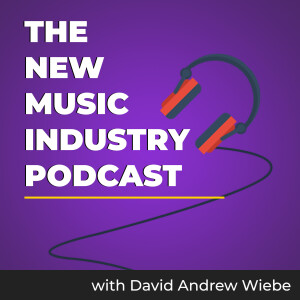
092 – The Importance of Metadata & Getting Credit for Your Work in the Studio – with Deborah Fairchild of VEVA Sound
 2018-05-10
2018-05-10
Download
Right click and do "save link as"
These days, recording project related data doesn’t get captured the way it used to. This leads to incomplete metadata and a loss of opportunity for those involved in the recording process.
In this episode of The New Music Industry Podcast, Deborah Fairchild of VEVA Sound shares about how easy it can be to collect the right data with their Studio Collect plugin.
Download the PDF Cheat Sheet
Podcast Highlights:
00:14 – Introductions
00:24 – What is VEVA Sound?
01:52 – Why is metadata so important?
03:51 – Why aren’t studios collecting recording data anymore?
09:33 – What are some common mistakes engineers make in recording data
11:14 – What have you seen people do with collecting data that surprised you?
13:20 – How does the Studio Collect Suite plugin work?
15:43 – Do you need a plugin like SCP to begin collecting recording data?
16:37 – How can metadata help with monetization?
18:18 – Where do you see things going next with metadata?
19:44 – What advice do you have for audio engineers?
20:50 – Conclusion
Transcription:
David Andrew Wiebe: Today I'm chatting with VEVA's executive vice president Deborah Fairchild. How are you today, Deborah?
Deborah Fairchild: I'm doing well. Thank you. How are you?
David: I'm great, thanks. Thank you for asking. So tell us a little bit about VEVA Sound and what you do.
Deborah: So, VEVA Sound is an asset management company that we started 16 years ago in Nashville. And we're the bridge between recording studios and the creatives and content owners. So we work with a lot of the major labels in the US and Europe, and Universal, Sony... Companies like that, as well as people like Bruce Springsteen, Garth Brooks, that own their masters, we can handle the catalog transfer, legacy equipment. So we have a collaboration with Blackbird Studios in Nashville where we pretty much have every piece of machinery available from every format that music was created in. But through the years, the past 10 years, especially we've focused in on everything is already digital. So there's a lot that goes on in the back end. You know, all the files, being on servers and recorded in studios and different houses and things like that. We facilitate the collection of the metadata and the audio files, and then provide it in platforms where companies and entities can utilize it and re-monetize it and repurpose it. Sorry, that was a little long winded?
David: No, that's very helpful. Why is metadata so important? And why should credits be collected during recording sessions?
Deborah: So, it's interesting... I've always been fascinated, I've been doing this now for 15 years, and everyone at VEVA has an engineering background. And we've all went to audio school and have worked in studios and part of the creative process. And what we found in our work that we do for the record labels and things like that, but for whatever reason, the concept of collecting your credits, while you create your your music is something that's been lost in the digital age. So previously, like when we've done transfer work, we were literally scanning track sheets that have all of the instruments and who played on it, and what studio they were in and the date and all kinds of information descriptive, and technical metadata about the recording. And when things have gone digital, it's really something that has been left behind. So what ends up happening is because of the way the fragmented recording process occurs, which is also really cool, you know, I can be in London and send files over to LA. And depending on the file size, they can have it in 20 minutes and download it and start working in LA on the same project. So everything is so fast paced, and people are forgetting that they need to, you know, write down who is there. So then eventually upon release, it can be discoverable and available to consumers. And so we're really hoping with the plugin we've created, it'll the ease of access to actually gather this data c...
view more
More Episodes
063 – David Andrew Wiebe on WeMaple
 2024-05-23
2024-05-23
 2024-05-23
2024-05-23
059 – From 0 to 5,200 Members… in a Year?!
 2024-04-25
2024-04-25
 2024-04-25
2024-04-25
055 – Breakthroughs in Confrontation
 2024-04-02
2024-04-02
 2024-04-02
2024-04-02
054 – Podcast Update for April 1, 2024
 2024-04-01
2024-04-01
 2024-04-01
2024-04-01
052 – You’re More Resilient Than You Know
 2024-03-21
2024-03-21
 2024-03-21
2024-03-21
051 – Rental Drama: The Sequel
 2024-03-20
2024-03-20
 2024-03-20
2024-03-20
012345678910111213141516171819
Create your
podcast in
minutes
- Full-featured podcast site
- Unlimited storage and bandwidth
- Comprehensive podcast stats
- Distribute to Apple Podcasts, Spotify, and more
- Make money with your podcast
It is Free
- Privacy Policy
- Cookie Policy
- Terms of Use
- Consent Preferences
- Copyright © 2015-2024 Podbean.com




